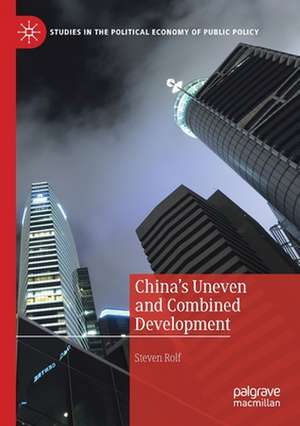China’s Uneven and Combined Development: Studies in the Political Economy of Public Policy
Autor Steven Rolfen Limba Engleză Paperback – 16 oct 2021
| Toate formatele și edițiile | Preț | Express |
|---|---|---|
| Paperback (1) | 497.64 lei 6-8 săpt. | |
| Springer International Publishing – 16 oct 2021 | 497.64 lei 6-8 săpt. | |
| Hardback (1) | 501.89 lei 6-8 săpt. | |
| Springer International Publishing – 16 oct 2020 | 501.89 lei 6-8 săpt. |
Din seria Studies in the Political Economy of Public Policy
-
 Preț: 219.95 lei
Preț: 219.95 lei -
 Preț: 385.84 lei
Preț: 385.84 lei - 15%
 Preț: 639.25 lei
Preț: 639.25 lei - 15%
 Preț: 698.80 lei
Preț: 698.80 lei -
 Preț: 380.45 lei
Preț: 380.45 lei - 15%
 Preț: 646.94 lei
Preț: 646.94 lei -
 Preț: 394.87 lei
Preț: 394.87 lei -
 Preț: 387.75 lei
Preț: 387.75 lei - 15%
 Preț: 701.25 lei
Preț: 701.25 lei - 18%
 Preț: 1009.08 lei
Preț: 1009.08 lei - 18%
 Preț: 1114.21 lei
Preț: 1114.21 lei - 15%
 Preț: 700.94 lei
Preț: 700.94 lei -
 Preț: 420.25 lei
Preț: 420.25 lei - 18%
 Preț: 889.26 lei
Preț: 889.26 lei - 15%
 Preț: 583.13 lei
Preț: 583.13 lei - 15%
 Preț: 508.75 lei
Preț: 508.75 lei - 15%
 Preț: 638.24 lei
Preț: 638.24 lei - 18%
 Preț: 721.19 lei
Preț: 721.19 lei - 18%
 Preț: 783.68 lei
Preț: 783.68 lei - 18%
 Preț: 780.16 lei
Preț: 780.16 lei
Preț: 497.64 lei
Preț vechi: 585.46 lei
-15% Nou
Puncte Express: 746
Preț estimativ în valută:
95.24€ • 99.06$ • 78.62£
95.24€ • 99.06$ • 78.62£
Carte tipărită la comandă
Livrare economică 15-29 aprilie
Preluare comenzi: 021 569.72.76
Specificații
ISBN-13: 9783030555610
ISBN-10: 3030555615
Pagini: 264
Ilustrații: XVII, 264 p. 13 illus., 12 illus. in color.
Dimensiuni: 148 x 210 mm
Greutate: 0.37 kg
Ediția:1st ed. 2021
Editura: Springer International Publishing
Colecția Palgrave Macmillan
Seria Studies in the Political Economy of Public Policy
Locul publicării:Cham, Switzerland
ISBN-10: 3030555615
Pagini: 264
Ilustrații: XVII, 264 p. 13 illus., 12 illus. in color.
Dimensiuni: 148 x 210 mm
Greutate: 0.37 kg
Ediția:1st ed. 2021
Editura: Springer International Publishing
Colecția Palgrave Macmillan
Seria Studies in the Political Economy of Public Policy
Locul publicării:Cham, Switzerland
Cuprins
Chapter 1: Introduction: China shakes the world-system.- Chapter 2: Uneven and combined development and the capitalist states-system.- Chapter 3: From varieties of capitalism to uneven and combined development: a new perspective.- Chapter 4: China’s boom (I): The geopolitical economy of reform and opening, 1978-2000.- Chapter 5: China’s boom (II): Making the ‘leap’, 2001-2008.- Chapter 6: The ‘rebalancing’ fallacy: 2008 and its aftermath.- Chapter 7: The state resurgent.- Chapter 8: Conclusion: China cracks the whip: The externalisation of China’s political economy
Notă biografică
Steven Rolf is ESRC Research Fellow at the Digital Futures at Work Research Centre, based at the University of Sussex, UK. He has previously worked at the University of Bristol, Aston University, and Birkbeck, University of London. He has also held visiting positions at City University Hong Kong and UCLA, USA.
Textul de pe ultima copertă
This book mobilises the theory of uneven and combined development to uncover the geopolitical economic drivers of China’s rise. The purpose is to explain the formation and trajectory of its economic ‘accumulation system’ — which remains a confounding hybrid of statist and neoliberal forms of capitalism — as the outcome of China’s geopolitical engagement of the USA during the late stages of the Cold War, and its participation in manufacturing global production networks (GPNs). Fear of geopolitical catastrophe drove China to open its economy, while GPNs enabled China to generate substantial export surpluses which could be recycled through state-owned banks as cheap credit and subsidies to large, vertically integrated and politically-controlled state-owned enterprises. In this way, a synergy emerged between the ‘neoliberal’ and ‘Keynesian-Fordist’ sectors of the economy, while the national-territorial state retained its form and expanded its functions. The book chronicles how this reliance on export surpluses, however, rendered China extremely vulnerable to external shocks — prompting a dramatic monetary and fiscal stimulus response to the crisis of 2008, even while sustaining the illusion of economic ‘decoupling’ from the global economy. Finally, it examines the growing role of the state in the current crisis-ridden economic model, as well as China’s current geoeconomic and geopolitical expansionism in areas such as the Belt and Road Initiative and the militarisation of the East and South China Seas.
Steven Rolf is ESRC Research Fellow at the Digital Futures at Work Research Centre, based at the University of Sussex, UK. He has previously worked at the University of Bristol, Aston University, and Birkbeck, University of London. He has also held visiting positions at City University Hong Kong and UCLA, USA.
Caracteristici
Outlines how China’s participation in manufacturing global production networks was shaped by geopolitical conflict and strategy Chronicles how China’s reliance on export surpluses prompted a dramatic monetary and fiscal stimulus response to the crisis of 2008 Examines the current crisis-ridden economic model and geoeconomic and geopolitical activities such as the Belt and Road Initiative and the militarisation of the East and South China Seas
